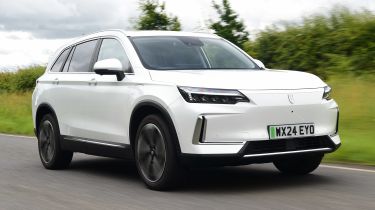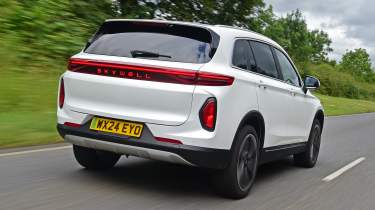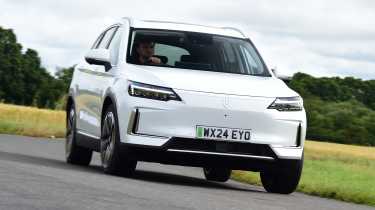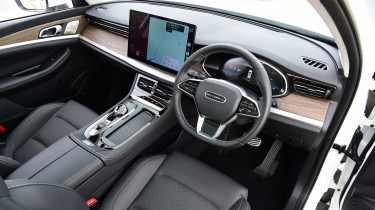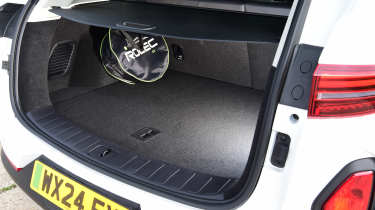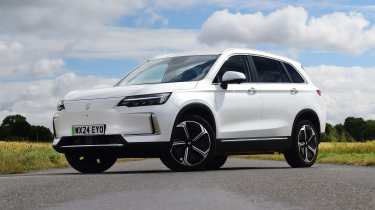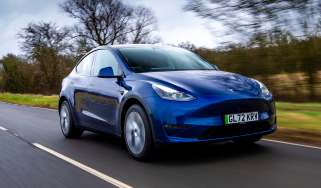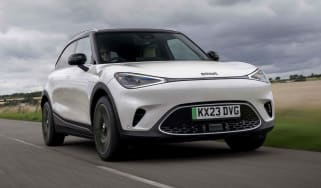Skywell BE11 review
The Skywell BE11 holds price and practicality amongst its merits, but lags behind its rivals in too many key areas
Is the Skywell BE11 a good car?
Skywell may be a complete unknown in the UK market, but the BE11 offers buyers a large electric car for the money. But while it scores on value, rear passenger space and comfort, in terms of chassis sophistication, powertrain calibration, performance, efficiency and charge speeds, it falls short of most electric family cars already on sale. If all you need is a huge car for not much money, then it’s a reasonable option, but if value is your main concern, we’d suggest dipping into the used market or looking towards smaller (but still highly practical) competitors such as the Kia EV3 or Skoda Elroq.
| Key specs | |
| Fuel type | Electric |
| Body style | 5dr SUV |
| Powertrain |
72kWh battery, 1x e-motor 86kWh battery, 1x e-motor |
| Safety | TBC |
| Warranty | 7yrs/100,000 miles |
How much does the Skywell BE11 cost?
Skywell is yet another Chinese car brand you haven’t heard of. While the likes of BYD and GWM Ora are well on the way to joining MG in establishing a foothold in the UK electric car market, Skywell is at the beginning of the journey.
An all-electric SUV, the Skywell BE11 is similar in size to the BMW iX3 and Skoda Enyaq, with prices starting from around £37,000 for the 72kWh battery or a fiver short of £40,000 for the larger 86kWh battery. That means the BE11 is cheaper than both the Toyota bZ4X and Volkswagen ID.4. On paper, that sounds like excellent value for money, especially when you consider the seven-year warranty.
The BE11 isn’t a particularly adventurous or innovative design, with a look both inside and out that borrows numerous design cues from other established manufacturers. The range estimate of around 300 miles for the largest battery version is also par for the course in 2024. Skywell hopes that the combination of keen pricing, a long warranty and lots of standard kit will be enough to tempt buyers away from the electric car establishment.
Electric motors, performance & drive
While EV drivers are used to the instant throttle response that an electric motor can provide,,the exact opposite is true here. Between pressing down on the throttle pedal and gaining any sort of response takes almost one full second. Just try to count that time out in your head and think about how that feels every time you want to pull out of a junction, perform an overtake, or simply maintain smooth progress along a straight road.
And when the throttle does come to life, it’s not very easy to modulate. We pulled out of several junctions only for the inside front tyre to light up in a flare of wheelspin – on one occasion when attempting to do so in a moderate hurry, it was enough to cause a smokey single-wheel burnout. That would be more understandable if the BE11 was fast, but with a 201bhp motor delivering a 0-62mph time of 9.6 seconds, it lags behind most electric rivals by a decent margin. Our car was fitted with tyres produced by Giti; we’ll hold full judgement on the traction struggles until Skywell confirms the rubber that will be supplied on UK cars.
Elsewhere there are issues with the calibration of the brakes. They’re very grabby when using the mechanical brakes at low speeds, and while we like that the regenerative braking system can be adjusted on a sliding scale, it isn’t aggressive enough in its strongest mode to allow for one-pedal driving.
Despite there being a few negatives to the way the BE11 drives, it does have its plus points. The chassis setup is soft by the class standards, so it’s among the more comfortable options at this price. Of course, that means that it’s not the sharpest car to drive – not really a big deal for a car in this segment – but there’s less excuse for a steering response that has lots of play, particularly around the straight ahead.
| Model | Power | 0-62mph | Top speed |
| Skywell BE11 72kWh | 201bhp | 9.6 seconds | 93mph |
| Skywell BE11 86kWh | 201bhp | 9.6 seconds | 93mph |
Electric motors, charging & running costs
Efficiency in the 86kWh model proved to be only okay in our hands. Lots of motorway driving liberated a figure of 3.4mi/kWh in warm conditions, which, thanks to its very large battery capacity, means you can expect 250 miles or so of real-world range. You will see slightly better from similarly sized electric SUVs; we achieved 3.8mi/kWh in similar conditions driving a Skoda Enyaq Coupe, while a Peugeot E-3008 is even more efficient.
Those rivals also charge at 135kW and 160kW, respectively, meaning relatively swift top-up times on longer trips. The BE11’s peak charging rate is just 80kW, and the company quotes rapid charge times from 20-70 per cent of battery charge, rather than the more widely used (and more generous) scale of 10-80 per cent. Using a charger capable of delivering 80kWs, it takes a leisurely 45 minutes to top up the long range 86kWh battery from 20-70 per cent, or 36 minutes if the BE11 is fitted with the standard range 72kWh battery. Utilise a home wallbox charger capable of charging at 7.4kW, and it’ll take around 13 hours to fully recharge the long range model from flat, and about 11 hours to do the same with the standard range car.
Although the insurance groups haven’t been announced, the BE11 is exempt from VED (road tax) and the London congestion charge – at least until 2025. The BE11 will also sit in lower tax bands than a traditional petrol or diesel SUV, making it a good choice for company car buyers. According to our expert data, the BE11 should maintain around 46 per cent of its original value after three years or 36,000 miles, which is on par with the Hyundai Kona Electric and Kia Niro EV.
| Model | Battery size | Range | Insurance group |
| Skywell BE11 | 72kWh | 248 miles | TBC |
| Skywell BE11 | 86kWh | 304 miles | TBC |
Design, interior & technology
UK buyers are treated to an SUV fitted with a ‘Skyroof’ panoramic roof, heated and cooled front seats, 128-colour interior ambient lighting, wireless Apple CarPlay and Android Auto, and an eight-speaker sound system, plus a huge list of other tech.
That’s all packed into an interior that looks clean and simple, and that undeniably draws influences from more familiar manufacturers. Smaller details, like the row of buttons on the centre console, the metallic speaker grilles, and the twin-hinged central storage cubby, remind us of Mercedes. While the single span of imitation wood running across the dashboard, punctuated by a vast 12.8-inch touchscreen poking out of its middle, has more than a whiff of Tesla Model Y about it.
The superficial quality feels fine, but we’d rank it closer to modern MGs than posher (and more expensive) options like the Peugeot E-3008 or Skoda Enyaq. The fake wood veneers, synthetic leather and chrome accents lack actual quality, but do create a good first impression.
Sat-nav, stereo and infotainment
The 12.8-inch touchscreen is sharp enough, but when Android Auto expands to its full size, it looks a little blocky and low-res, and you can’t then change the on-screen climate controls easily. For that, you’ll need to close the smartphone mirroring screen and go back into the proprietary infotainment system – a fiddly task on the move. The eight-speaker sound system is supplied by the German company Metz.
Boot space, comfort & practicality
| Dimensions | |
| Length | 4,720mm |
| Width | 1,908mm |
| Height | 1,696mm |
| Number of seats | 5 |
| Boot space | 467-1,141 litres |
The BE11’s rear seat area is simply vast. Knee room, in particular, is almost limo-like, and headroom is fantastic, too. Save for a floor area that is a touch too high compared to the seat base, it’s genuinely superb for passengers in the second row.
A 467-litre boot is decent enough, but the luggage capacity falls short of Skoda Enyaq’s 585 litres or the 510-litre boot in the BMW iX3, and is more on a par with smaller EVs, such as the 466-litre boot in the Hyundai Kona Electric, or the 475-litre luggage area in the Kia Niro EV. Both of these alternatives have more capacity than the BE11 when the back seats are folded down.
Safety & reliability
| Key standard safety features | Euro NCAP safety ratings |
|
|
Although the Skywell BE11 hasn’t been tested by independent crash experts Euro NCAP, it does come with a decent level of safety equipment, including adaptive cruise control, blind spot recognition, a 360-degree surround-view camera system, lane keep assistance, and speed limit recognition.
As a new car from a new (to the UK) brand, the BE11 hasn’t appeared in our Driver Power owner satisfaction survey, but we’d expect the electric powertrain to provide few problems. Our question marks, for now, surround the interior quality and infotainment system, although the seven-year warranty should provide potential buyers with some reassurance.
Skywell BE11 alternatives
Although Skywell has aspirations of taking on the likes of BMW and Mercedes, the BE11 is more a rival to the likes of the MG ZS EV and other Chinese SUVs.
While the BE11 is reasonably priced, it isn’t significantly cheap enough compared with the Skoda Enyaq for us to recommend it over its Czech counterpart, plus that rival is getting a significant facelift soon, which might yield further improvements on an already excellent package. Plus there are more affordable options in the form of the Skoda Elroq and Kia EV3 that both offer a more polished driving experience and greater range in their respective long-range versions, while still offering plenty of practicality for a family.
Frequently Asked Questions
The BE11 is covered by an excellent seven-year or 100,000-mile warranty, whichever comes first. This is identical to the cover provided by MG, but better than many other mainstream manufacturers.
